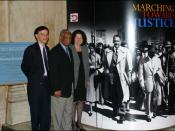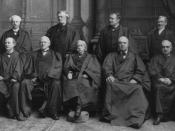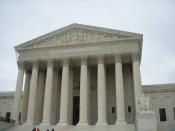Brown vs. Board of Education of Topeka Kansas
a. In Topeka, Kansas, a black third-grader named Linda Brown had to walk several miles to get to her black elementary school, even though a white elementary school was closer. She was denied admission to public schools in her community because of her race. This occurrence gave the NAACP the perfect opportunity to challenge segregation in public schools. The case intended to forbid the segregation of Topeka's public schools and raised the question whether the racial classifications in public school admissions are a violation of equal protection. The case was first heard by the Supreme Court in December of 1952. However, because of the courts indecision, the case was reargued in December of 1953. The case was finally decided on May 17, 1954 in favor of Brown.
b. The Supreme Court case is significant to American politics because it was a giant step towards complete desegregation of public schools.
In addition, it signified the beginning of the civil rights movement.
c. The court case undermined the precedent of the "separate but equal" doctrine of Plessy vs. Ferguson. Chief Justice Earl Warren declared that this was inherently not equal and thus unconstitutional. The Supreme Court interpreted the Fourteenth Amendment to mean that the Constitution is color-blind.
Baker vs. Carr
a. In Tennessee, a voter named Charles Baker brought suit against Secretary of State Joe Carr. The state of Tennessee had failed to reapportion the state legislature for 60 years despite population growth and redistribution. His argument was that this discrepancy was causing him to fail to receive the "equal protection under the law" required by the Fourteenth Amendment. The U.S Supreme Court handed down their ruling on November 21, 1964.
b. This decision was significant in American politics because prior to this ruling,


